 MyDogBreeds
MyDogBreeds Kyi-Leo is originated from United States but Kishu is originated from Japan. Kyi-Leo may grow 26 cm / 10 inches shorter than Kishu. Kyi-Leo may weigh 21 kg / 46 pounds lesser than Kishu. Both Kyi-Leo and Kishu has almost same life span. Both Kyi-Leo and Kishu has almost same litter size. Both Kyi-Leo and Kishu requires Moderate maintenance.
Kyi-Leo is originated from United States but Kishu is originated from Japan. Kyi-Leo may grow 26 cm / 10 inches shorter than Kishu. Kyi-Leo may weigh 21 kg / 46 pounds lesser than Kishu. Both Kyi-Leo and Kishu has almost same life span. Both Kyi-Leo and Kishu has almost same litter size. Both Kyi-Leo and Kishu requires Moderate maintenance.
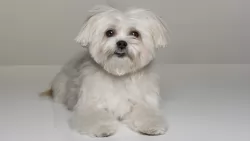 The Kyi-Leo first came about in the 1950s in San Francisco, USA, with the crossing of two dog breeds – the Lhasa Apso and the Maltese.
The Kyi-Leo first came about in the 1950s in San Francisco, USA, with the crossing of two dog breeds – the Lhasa Apso and the Maltese.
Because this is a mixed-breed dog, it isn’t recognized by the American Kennel Club, but it is recognized by some of the other dog associations such as the American Rare Breed Association or ARBA as it is known. Today the dog is looked upon as a designer breed.
 The Kishu is a Spitz type hunting dog that originates from Japan. Many people believe he is a descendant of the wolf. Those who have studied the dog say that it has kept its genetic purity and that there has been very little cross breeding with other dogs.
The Kishu is a Spitz type hunting dog that originates from Japan. Many people believe he is a descendant of the wolf. Those who have studied the dog say that it has kept its genetic purity and that there has been very little cross breeding with other dogs.
The Kishu is also known as the Kumano Ken, a name given after the area the dog originated from. The breed was officially recognized and standardized in 1934, and is known as the Kishu Ken. In 1934 the dog was also designated a Living Natural Monument in Japan and is protected by law.
The dog is also included in the group ‘Asian Spitz and Related Breeds’ class of primitive dogs.
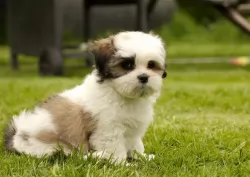 The Kyi-Leo is a small dog standing at 20 – 30cm in height and weighing in the region of 4 – 6kg.
The Kyi-Leo is a small dog standing at 20 – 30cm in height and weighing in the region of 4 – 6kg.
He has a long, silky coat which is essentially black and white or grey/silver and white or even gold and white. He has frail legs which can become injured or broken in vigorous rough and tumble games.
You can certainly describe the Kyi-Leo as a sweet, quiet, non-aggessive playful dog, and for anyone who wants a splendid pet and companion, this dog makes a great family pet and he won’t cost you an arm and a leg to feed either.
He also has an acute sense of hearing and this turns him into an excellent ‘alarm’ watch-dog. It is also a dog, that while he will love to join you on a walk, he isn’t a dog that is going to demand a lot of exercise.
He responds well to his human family, is easy-going and gentle, tending to be cautious around strangers. You can trust him to be an awesome playmate for children. In this instance, it’s the children who should be warned when playing with a dog like this as, because of his fragile build, he could easily be injured by children who haven’t been taught to respect animals.
Even though he is such an amicable pet, it will still be of benefit to you and him to have him trained and socialized. Then he responds well to basic commands such as sit, stay and lie-down.
Dogs who spend time with their family, pick up on the ‘culture’ of the family and they learn how to behave. Dogs who are left on their own and never socialized can become nervous and aggressive towards people as they never got to learn how to behave – they weren’t socialized.
 The Kishu is a medium sized dog standing between 43 – 56cm in height and weight is between 14 – 27kg.
The Kishu is a medium sized dog standing between 43 – 56cm in height and weight is between 14 – 27kg.
He has a short, straight double coat which can be white, red or brindle. The dog has minimal shedding, making him an easy dog to groom.
The nose of the dog is black, but particularly with the white coated dogs, the nose can be brownish or pink in color. The ears are erect and pointed forwards and the tail is carried slightly curved over the dog's back.
The docile Kishu is no pushover and he is a strong minded, courageous dog. He is also an amicable dog breed, getting on well with his human family as well as with other dogs in the home.
He is somewhat aloof and reserved around strangers. Even though he is a docile dog, it is a good idea to have him trained and socialized so that he can be obedient and balanced in all situations.
He is intelligent and learns easily. An interesting aspect with the Kishu Ken is that he likes to take in everything going on from a vantage point, often seeking out a higher spot from where he can look about.
Kishu Kens like to keep an eye on whatever is going on, and sometimes he looks for a high place so that he can survey everything. They can be aloof or shy around strangers.
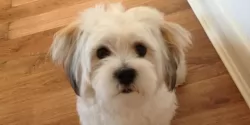 The Kyi-Leo is everything you want in a family companion – active, playful, loving, gentle, happy and balanced.
The Kyi-Leo is everything you want in a family companion – active, playful, loving, gentle, happy and balanced.
He loves his human family but tends to be a little bit wary around strangers, gradually warming to them.
He may be small, but he is robust and alert, and he is also capable of making you a good watchdog.
The Kyi-Leo is an all-round great little pet to have.
 The Kishu is a hardy dog breed known for his exceptional hunting instincts and loyalty. He is a brave, clever, playful, tenacious dog eager to please his master.
The Kishu is a hardy dog breed known for his exceptional hunting instincts and loyalty. He is a brave, clever, playful, tenacious dog eager to please his master.
He isn’t so much a hunting dog anymore but is essentially a companion dog, bonding closely with his human family. He will get on well with children and pets in the home, but more so when he has been trained and socialized.
Apart from making a splendid companion, the Kishu promises to be an excellent guard dog to anyone who threatens his human family.
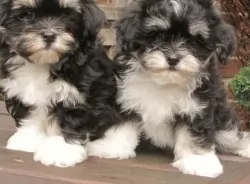 Your Kyi-Leo is such a feisty, robust little dog who is not likely to cost you much in terms of health care. With his frail legs, it is a good thing to know that you need to be careful with him in terms of back-and joint problems.
Your Kyi-Leo is such a feisty, robust little dog who is not likely to cost you much in terms of health care. With his frail legs, it is a good thing to know that you need to be careful with him in terms of back-and joint problems.
There are actually knee joint issues which are fairly common in small dogs, one of which is patellar luxation.
This is where the kneecap pops out of the thighbone, causing the dog to skip or hop. Some joint issues are genetic and may require surgery. Make sure to keep your pet’s weight under control to remove additional stress on the joints.
This is another dog illness you want to be careful with. Acute pancreatitis -inflammation - is when the condition comes on suddenly while chronic pancreatitis is when pancreatitis occurs over a period of time.
With acute pancreatitis in dogs you’ll see symptoms such as vomiting, abdominal pain, tremors and reluctance to eat. Pancreatitis can be brought on by too much fat, especially rancid fat, some anti-biotics, a low protein diet or a sickness such as diabetes.
If you suspect pancreatitis in your dog, get him as quickly as possible to the vet.
 Before you bring a new puppy or rescue dog into your home, you must be prepared for the responsibility of a dog. If you're just simply looking for a watchdog to stick into your backyard, you're being cruel.
Before you bring a new puppy or rescue dog into your home, you must be prepared for the responsibility of a dog. If you're just simply looking for a watchdog to stick into your backyard, you're being cruel.
A dog is a social creature and you need to spend time with them and care for them. Sometimes he can get sick and then you may need to get him to the vet.
Some of the illnesses your Kishu can get will be easily treatable, while others may be life-threatening and require surgery.
The health of your dog will depend a lot on the food you provide it with as well as your lifestyle. Common dog health problems can range from typical eye- and ear infections to bloat, hip dysplasia and cancers.
The thyroid gland doesn’t produce enough thyroid hormone which can lead to other health problems such as tiredness and weight gain. A daily thyroid pill from the vet can help sort this issue out.
This is a common health problem, seen more in older dogs. Your once active dog will move around slower and battle to stand up after lying down.
Arthritis can’t be cured but you can alleviate the pain and suffering. Your vet will tell you that diet and nutrition are important factors to ward off arthritis in the first place.
If your dog has arthritis and is in pain, get him to your vet who can prescribe medications to alleviate the symptoms.
This is a respiratory infection which can be transmitted from one dog to another. You’ll notice coughing, tiredness, runny nose and watery eyes and loss of appetite. Take him to your vet who will know what to do to speed up recovery for your pet.
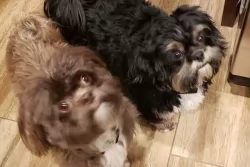 The Kyi-Leo doesn’t require vigorous exercising. One walk a day will keep them happy. There are pet owners who believe dogs can be permanently outside dogs where they can do their own exercise.
The Kyi-Leo doesn’t require vigorous exercising. One walk a day will keep them happy. There are pet owners who believe dogs can be permanently outside dogs where they can do their own exercise.
Everybody who knows dogs, knows they are social creatures who will simply lie at your backdoor just waiting for some response from their beloved human family. Every dog, regardless of breed or size, needs exercise and interaction with their humans every day.
Dogs left alone in the yard day after day are loney, frustrated and bored, and when they start digging or barking, irresponsible owners will ill treat them. These kind of people should never own a dog.
The Kyi-Leo has a sensitive stomach so he’ll need good quality food to avoid digestive problems. Ideally home-cooked food such as softly boiled chicken, brown rice and raw or cooked vegetables added into top quality kibble is the preferred diet.
Fresh, cool water needs to be constantly available.
Brush the long, silky coat at least twice a week to ensure it remains free of knotting. Brushing keeps the coat shiny too.
As a long eared dog, ears should be checked and cleaned regularly too. Air doesn’t reach the inside of their ears and the warm dampness in the ears are a breeding place for infection.
Nails should also be trimmed when they become long because left uncut they can hook onto things causing injury ad pain.
Small dogs are more prone to tartar formation and loss of teeth. You’ll notice that something isn’t right because your lively little dog will be lethargic, he may not want to eat his food and his face may be swollen. When you suspect dental problems, get him to the vet.
 The Kishu will need to be brushed twice a week to keep the coat free of dust and loose hairs. Their ears should be checked regularly too for wax build up and dirt as ear infections are a common dog illness.
The Kishu will need to be brushed twice a week to keep the coat free of dust and loose hairs. Their ears should be checked regularly too for wax build up and dirt as ear infections are a common dog illness.
Their nails should also be trimmed regularly. Take him regularly to have his teeth cleaned because dental problems can put his entire body at risk for disease.
The Kishu needs a good sized garden to roam. He is best suited to country life because he needs regular exercise. If he lives in the city, put him on a leash and take him for walks.
Apart from exercise, good food is imperative as nutritious food contributes to longevity. Top quality food and the right size portions can ensure lean, energetic, happy, healthy dogs.
Take trouble to understand the ingredients listed on the commercial dog food packaging. Generally the low quality, processed commercial foods are inflammatory.
Even if you go for the top brand kibble, don’t just provide your pet with dry kibble night after night. Mix in some cooked chicken, brown rice and vegetables.
Remember too, that fresh whole foods such as vegetables have live enzymes and are packed full of fiber which is so necessary for digestion. A good diet with fresh, cool water is guaranteed to provide an excellent dimension to your pet’s health.